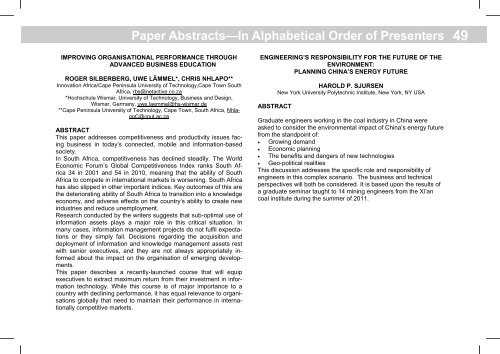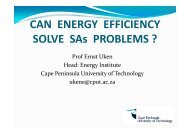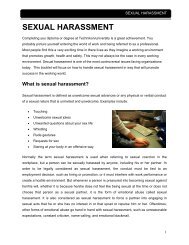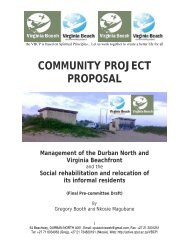Conference Booklet 11 Nov - Nina - CPUT ACTIVE Web - Cape ...
Conference Booklet 11 Nov - Nina - CPUT ACTIVE Web - Cape ...
Conference Booklet 11 Nov - Nina - CPUT ACTIVE Web - Cape ...
Create successful ePaper yourself
Turn your PDF publications into a flip-book with our unique Google optimized e-Paper software.
Paper Abstracts—In Alphabetical Order of Presenters<br />
IMPROVING ORGANISATIONAL PERFORMANCE THROUGH<br />
ADVANCED BUSINESS EDUCATION<br />
ROGER SILBERBERG, UWE LÄMMEL*, CHRIS NHLAPO**<br />
Innovation Africa/<strong>Cape</strong> Peninsula University of Technology,<strong>Cape</strong> Town South<br />
Africa, rbs@netactive.co.za<br />
*Hochschule Wismar, University of Technology, Business and Design,<br />
Wismar, Germany, uwe.laemmel@hs-wismar.de<br />
**<strong>Cape</strong> Peninsula University of Technology, <strong>Cape</strong> Town, South Africa, NhlapoC@cput.ac.za<br />
ABSTRACT<br />
This paper addresses competitiveness and productivity issues facing<br />
business in today’s connected, mobile and information-based<br />
society.<br />
In South Africa, competitiveness has declined steadily. The World<br />
Economic Forum’s Global Competitiveness Index ranks South Africa<br />
34 in 2001 and 54 in 2010, meaning that the ability of South<br />
Africa to compete in international markets is worsening. South Africa<br />
has also slipped in other important indices. Key outcomes of this are<br />
the deteriorating ability of South Africa to transition into a knowledge<br />
economy, and adverse effects on the country’s ability to create new<br />
industries and reduce unemployment.<br />
Research conducted by the writers suggests that sub-optimal use of<br />
information assets plays a major role in this critical situation. In<br />
many cases, information management projects do not fulfil expectations<br />
or they simply fail. Decisions regarding the acquisition and<br />
deployment of information and knowledge management assets rest<br />
with senior executives, and they are not always appropriately informed<br />
about the impact on the organisation of emerging developments.<br />
This paper describes a recently-launched course that will equip<br />
executives to extract maximum return from their investment in information<br />
technology. While this course is of major importance to a<br />
country with declining performance, it has equal relevance to organisations<br />
globally that need to maintain their performance in internationally<br />
competitive markets.<br />
ENGINEERING’S RESPONSIBILITY FOR THE FUTURE OF THE<br />
ENVIRONMENT:<br />
PLANNING CHINA’S ENERGY FUTURE<br />
ABSTRACT<br />
HAROLD P. SJURSEN<br />
New York University Polytechnic Institute, New York, NY USA<br />
Graduate engineers working in the coal industry in China were<br />
asked to consider the environmental impact of China’s energy future<br />
from the standpoint of:<br />
• Growing demand<br />
• Economic planning<br />
• The benefits and dangers of new technologies<br />
• Geo-political realities<br />
This discussion addresses the specific role and responsibility of<br />
engineers in this complex scenario. The business and technical<br />
perspectives will both be considered. It is based upon the results of<br />
a graduate seminar taught to 14 mining engineers from the Xi’an<br />
coal institute during the summer of 20<strong>11</strong>.<br />
49





